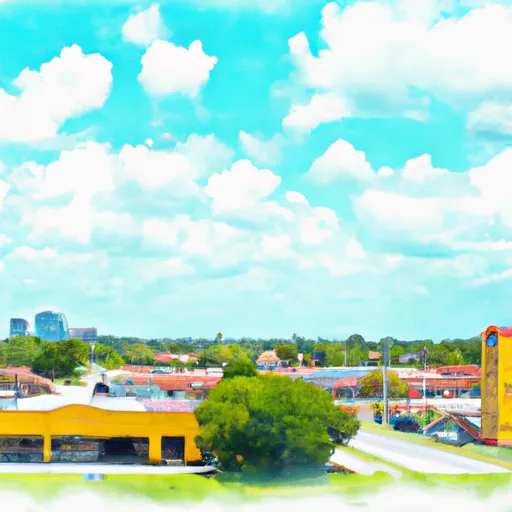-
 Snoflo Premium
Snoflo Premium
Get unlimited access to all our content
With no Ad interruptions! - Start Your Free Trial Login with existing account
Immokalee
Eden Index
Climate
6.4
•
Recreation
3.8
•
Community
1.1
•
Safeguard
4.2/10

Immokalee is a small town located in Collier County, Florida. With a subtropical climate, Immokalee experiences hot and humid summers, with average temperatures ranging from the mid-80s to low 90s Fahrenheit (29-35 degrees Celsius). Winters are mild, with temperatures typically in the mid-50s to low 70s Fahrenheit (12-23 degrees Celsius). The area is also prone to occasional thunderstorms and hurricanes due to its proximity to the Gulf of Mexico.
Hydrologically, Immokalee is surrounded by several lakes and canals, with the primary water source being Lake Trafford. Additionally, the town lies within the Big Cypress Swamp, which is an essential component of the Everglades ecosystem. The hydrology of the region supports abundant wildlife, including alligators, wading birds, and various fish species.
Outdoor recreation opportunities in Immokalee are plentiful. Visitors can explore the scenic beauty of the Big Cypress National Preserve, which offers hiking trails, camping, birdwatching, and airboat tours. Nearby Lake Trafford provides opportunities for fishing, boating, and wildlife viewing. Nature enthusiasts can also visit Corkscrew Swamp Sanctuary, a popular spot for birding and walking along boardwalks through the wetlands. Overall, Immokalee offers a unique outdoor experience with its diverse flora and fauna in the heart of Southwest Florida.
What is the Eden Index?
The Snoflo Eden Index serves as a comprehensive rating system for regions, evaluating their desirability through a holistic assessment of climate health, outdoor recreation opportunities, and natural disaster risk, acknowledging the profound impact of these factors on livability and well-being.
Climate Health Indicator (CHI): 6.4
Immokalee receives approximately
1316mm of rain per year,
with humidity levels near 88%
and air temperatures averaging around
23°C.
Immokalee has a plant hardyness factor of
10, meaning
plants and agriculture in this region tend to thrive here all year round.
By considering the ideal temperature range, reliable water supplies, clean air, and stable seasonal rain or snowpacks, the Climate Health Indicator (CHI) underscores the significance of a healthy climate as the foundation for quality living.
A healthy climate is paramount for ensuring a high quality of life and livability in a region, fostering both physical well-being and environmental harmony. This can be characterized by ideal temperatures, reliable access to water supplies, clean air, and consistent seasonal rain or snowpacks.
Weather Forecast
Streamflow Conditions
Southern Florida
Area Rivers
Southern Florida
Snowpack Depths
Southern Florida
Reservoir Storage Capacity
Southern Florida
Groundwater Levels
Recreational Opportunity Index (ROI): 3.8
The Recreational Opportunity Index (ROI) recognizes the value of outdoor recreational options, such as parks, hiking trails, camping sites, and fishing spots, while acknowledging that climate plays a pivotal role in ensuring the comfort and consistency of these experiences.
Access to outdoor recreational opportunities, encompassing activities such as parks, hiking, camping, and fishing, is crucial for overall well-being, and the climate plays a pivotal role in enabling and enhancing these experiences, ensuring that individuals can engage in nature-based activities comfortably and consistently.
Camping Areas
| Campground | Campsites | Reservations | Toilets | Showers | Elevation |
|---|---|---|---|---|---|
| Arbuckle - Lake Wales Ridge SF | None | 87 ft | |||
| Lake Arbuckle Co Park | 30 | 62 ft | |||
| Fisheating Creek Campground | 120 | 55 ft | |||
| Burns Lake - Big Cypress National Preserve | 14 | 9 ft | |||
| Highlands Hammock State Park | None | 136 ft | |||
| Bear Island - Big Cypress WMA | None | 44 ft | |||
| Collier - Seminole State Park | None | 7 ft | |||
| Ortona South | None | 16 ft | |||
| Avon Park AF Range Military | 40 | 71 ft |
Catastrophe Safeguard Index (CSI):
The Catastrophe Safeguard Index (CSI) recognizes that natural disaster risk, encompassing floods, fires, hurricanes, and tornadoes, can drastically affect safety and the overall appeal of an area.
The level of natural disaster risk in a region significantly affects safety and the overall livability, with climate change amplifying these risks by potentially increasing the frequency and intensity of events like floods, fires, hurricanes, and tornadoes, thereby posing substantial challenges to community resilience and well-being.
Community Resilience Indicator (CRI): 1.1
The Community Resilience Indicator (CRI) recognizes that education, healthcare, and socioeconomics are crucial to the well-being of a region. The CRI acknowledges the profound impact of these elements on residents' overall quality of life. By evaluating educational resources, healthcare accessibility, and economic inclusivity, the index captures the essential aspects that contribute to a thriving community, fostering resident satisfaction, equity, and social cohesion.

